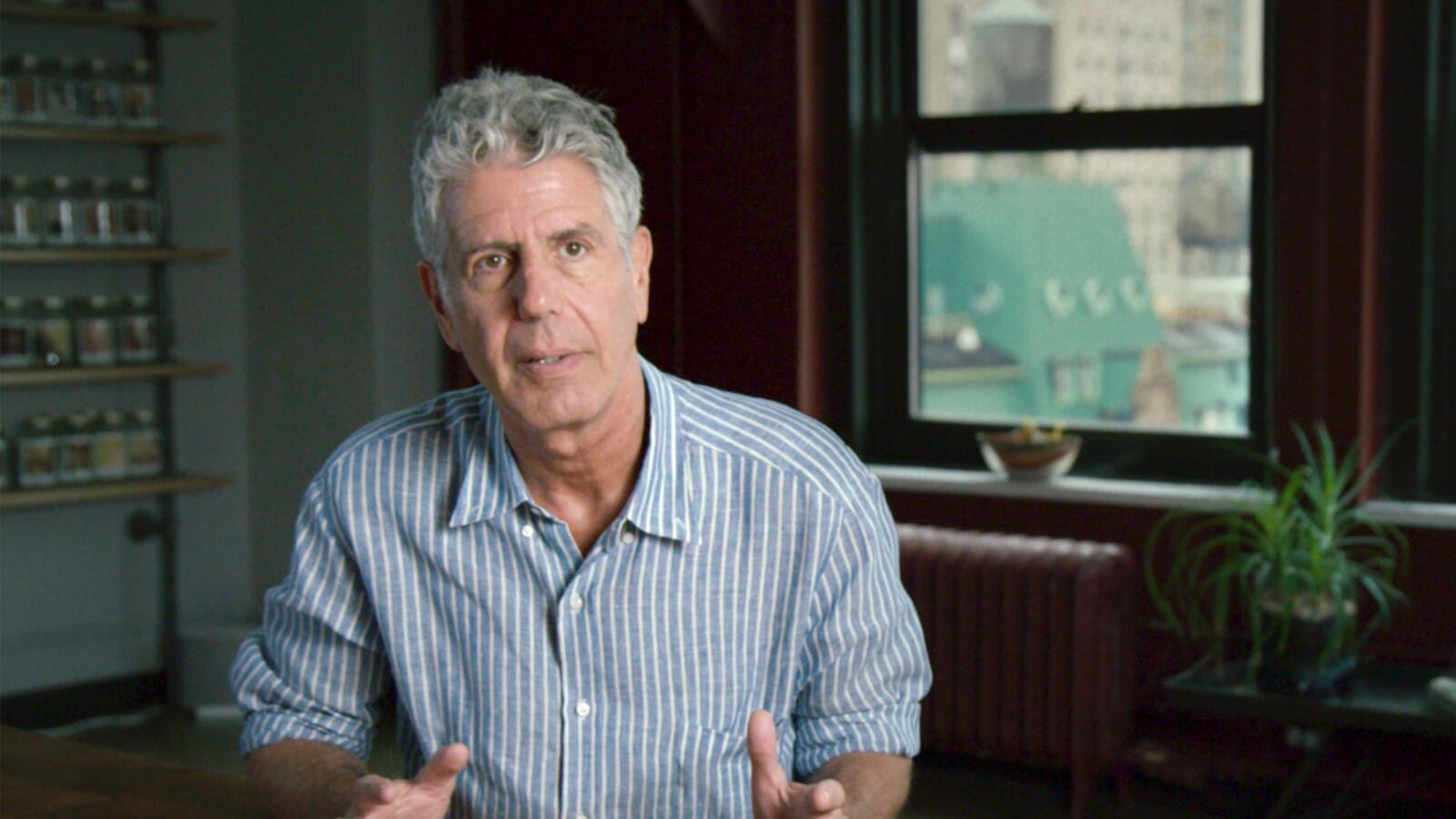Anthony Bourdain is officially unimpressed by the latest power ranking of the World’s 50 Best Restaurants. “Everybody is playing along because nobody wants the party to stop,” he says. “A lot of people benefit from it, but I think most of the chefs on it know it’s bullshit.”
Bourdain’s latest project, documentary Jeremiah Tower: The Last Magnificent, which he produced, hammers home his point about the long-term value of rankings and awards that the food world is so obsessed with these days. The film, which will be released this Friday in New York and Los Angeles, is a cautionary tale about the fleeting nature of fame. It examines how chef Jeremiah Tower was essentially written out of culinary history and largely forgotten. An amazing turn of events given the fact the he was incredibly well-known and influential, even winning the James Beard Award for Best Chef in America in 1996.
Reading Tower’s book, California Dish, (which was recently retitled Start the Fire), made Bourdain “realize to what extent I had been influenced by him and cooked his food and lived in his world without most of the time even knowing it. I was unaware that so many of these things I’d taken for granted for much of my cooking career had been either started by or were Jeremiah Tower innovations.”
It also inspired Bourdain to set the record straight. “Initially, I was driven specifically by this feeling of wanting to get justice for Jeremiah and I don’t know [if] that is a particularly noble intention when you’re looking to make a film—to be that agenda driven,” he says. But “at the end, you’re looking for a ripping good story and a great character and I think we got that in spades.”
While bookstores and movie theaters have recently been flooded with countless memoirs and films that depict supposed food pioneers, Tower’s significance and creativity are undeniable. “Jeremiah changed the world of restaurants and restaurant cooking,” Bourdain told me. He was so important, that Bourdain thinks that perhaps only Julia Child was more influential in changing how Americans eat.
Tower, Bourdain argues, may have also been the first true celebrity chef. “Look, it cannot be understated the importance of the simple fact that Jeremiah was the first fuckable American chef,” he put it to me bluntly. “People showed up at Jeremiah Tower-run restaurants to see Jeremiah because they wanted to be in his orbit.”
That was quite a change, given that “prior to Jeremiah the chef was the backstairs help. The dining public didn’t particularly care what the chef’s opinion was or what the chef thought they should eat. The chef was there to serve them. They were the decision makers.”

The film, which includes extensive interviews with culinary heavy weights including Mario Batali, Wolfgang Puck, Ruth Reichl, Martha Stewart, Jonathan Waxman, and Bourdain, makes a convincing case for reexamining Tower’s career, which started in Berkeley with Alice Waters at Chez Panisse.
In the film, Tower takes credit for moving the landmark restaurant from its hippy and French roots to a focus on celebrating American ingredients and wine, which became the restaurant’s and Waters’s signature. Their complicated relationship blew up when Waters published her book, the Chez Panisse Menu Cookbook. Tower alleges in the film, that she took all the credit for the menus, which he claims to have solely developed.
Bourdain, who has sparred with Waters in the past, is willing to give her credit for the success of the restaurant “but I don’t think it’s something that could be laid entirely at her door.” And even more troubling, he says, is that the food press was all too happy that Tower had been exorcised from the Chez Panisse story. “I think there was a willingness, a complicity, a collective instinct to write Jeremiah, this inconvenient, difficult man, out of history.”
Tower’s public outrage over Waters’s book led to a fracturing of the food scene. And ultimately Waters has gotten the credit and acclaim for the success of the restaurant and with helping to kick-start an American cooking revolution that showcased local ingredients and local farmers.
To this day, Tower is still a polarizing figure in the food world and Bourdain admits he got pushback when he started working on the project. “He made a lot of enemies,” says Bourdain. So much so that the film’s producers had a hard time setting up screenings in San Francisco. “There are places in this world where no one is too eager to hear the Jeremiah Tower story because it’s not the story they’ve been telling.”

Tower started his own wildly popular San Francisco restaurant, Stars, which helped change restaurant design and became a destination popular with celebrities and politicians alike. But thanks to a perfect storm of events, including a massive earthquake in the Bay Area, Stars closed and Tower fled to Mexico leaving friends and customers wondering what happened to him.
Like a missing spouse on a soap opera who turns up years later, in 2014 Tower magically resurfaced to help turn around New York’s struggling landmark Tavern on the Green. The film chronicles the highs and lows of his third act, while he tries to sort out his place in the modern culinary universe. Ironically, many of the techniques and recipes that had made him a standout 20 years ago, are now commonplace around the country.
Through the making of the film Bourdain also seems to be trying to conjure up Tower’s pervious greatness. It makes sense given that even though Bourdain can eat anywhere and everywhere that he wants, the two places that he’d most like to go to are long gone. “I would’ve loved to have eaten at Stars or at Chez Panisse back when Jeremiah was running the kitchen,” he admits.






